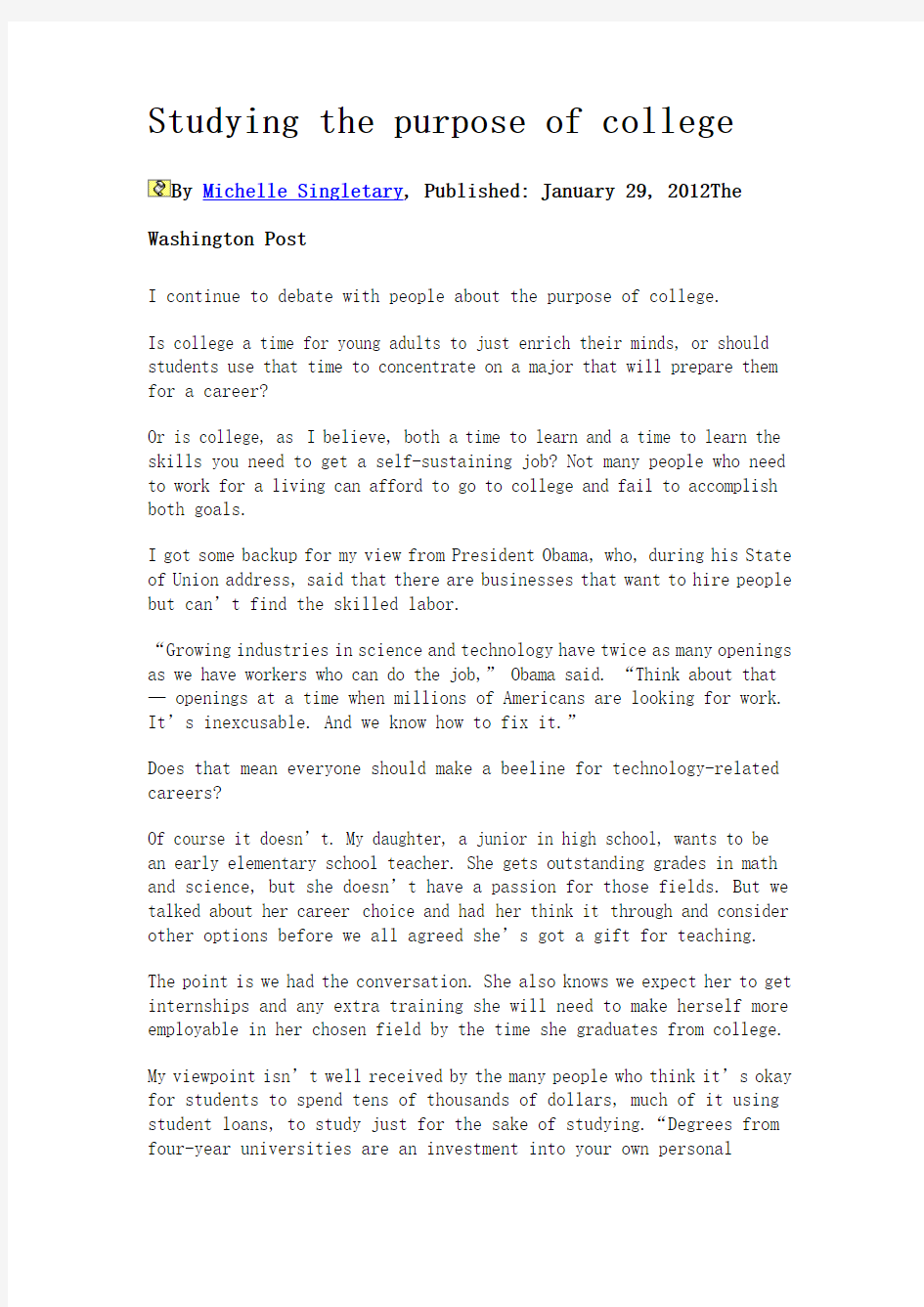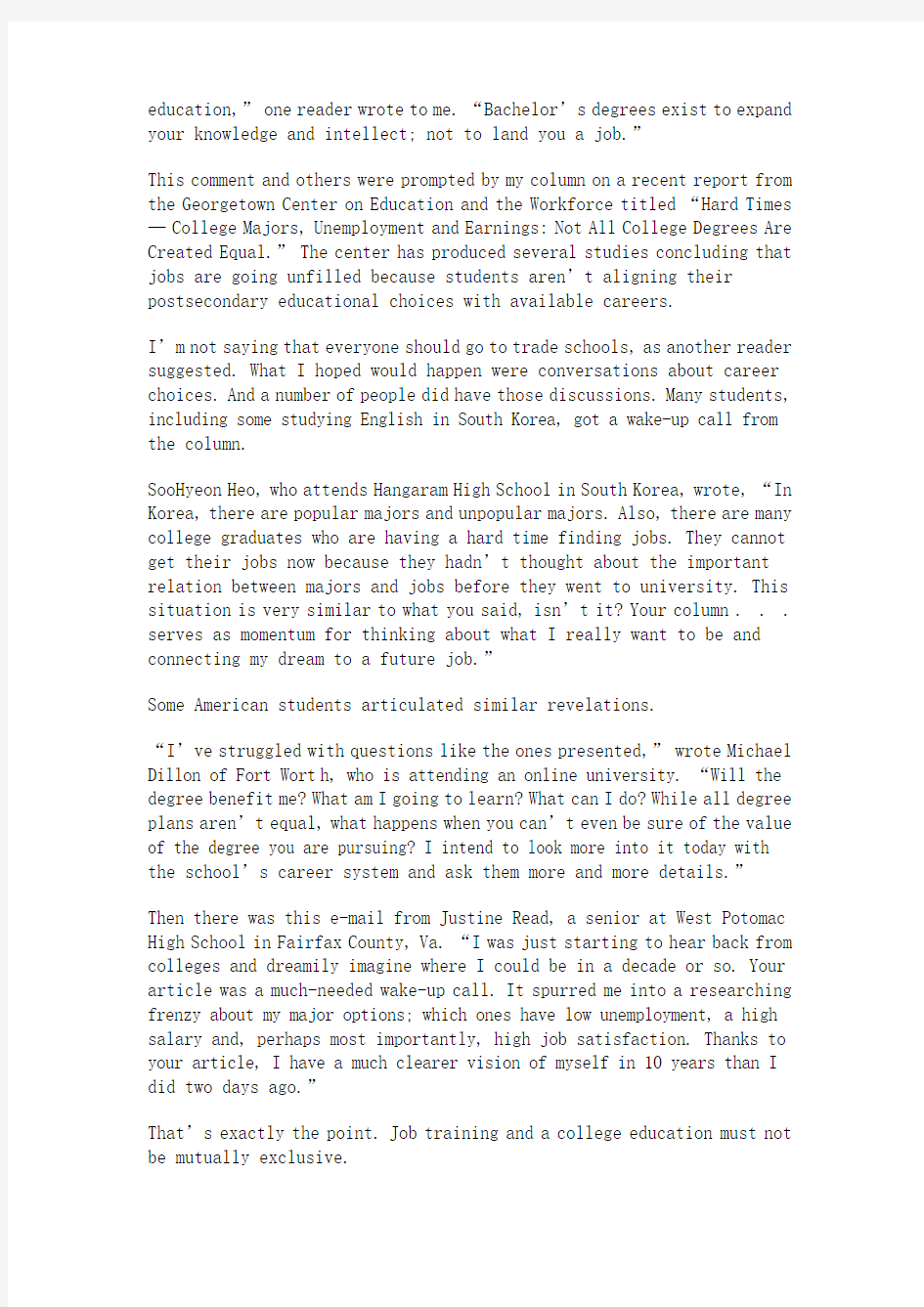Studying the purpose of college


Studying the purpose of college By Michelle Singletary, Published: January 29, 2012The
Washington Post
I continue to debate with people about the purpose of college.
Is college a time for young adults to just enrich their minds, or should students use that time to concentrate on a major that will prepare them for a career?
Or is college, as I believe, both a time to learn and a time to learn the skills you need to get a self-sustaining job? Not many people who need to work for a living can afford to go to college and fail to accomplish both goals.
I got some backup for my view from President Obama, who, during his State of Union address, said that there are businesses that want to hire people but can’t find the skilled labor.
“Growing industries in science and technology have twice as many openings as we have workers who can do the job,” Obama said. “Think about that — openings at a time when millions of Americans are looking for work. It’s inexcusable. And we know how to fix it.”
Does that mean everyone should make a beeline for technology-related careers?
Of course it doesn’t. My daughter, a junior in high school, wants to be an early elementary school teacher. She gets outstanding grades in math and science, but she doesn’t have a passion for those fields. But we talked about her career choice and had her think it through and consider other options before we all agreed she’s got a gift for teaching.
The point is we had the conversation. She also knows we expect her to get internships and any extra training she will need to make herself more employable in her chosen field by the time she graduates from college.
My viewpoint isn’t well received by the many people who think it’s okay for students to spend tens of thousands of dollars, much of it using student loans, to study just for the sake of studying.“Degrees from four-year universities are an investment into your own personal
education,” one reader wrote to me. “Bachelor’s degrees exist to expand your knowledge and intellect; not to land you a job.”
This comment and others were prompted by my column on a recent report from the Georgetown Center on Education and the Workforce titled “Hard Times —College Majors, Unemployment and Earnings: Not All College Degrees Are Created Equal.” The center has produced several studies concluding that jobs are going unfilled because students aren’t aligning their postsecondary educational choices with available careers.
I’m not saying that everyone should go to trade schools, as another reader suggested. What I hoped would happen were conversations about career choices. And a number of people did have those discussions. Many students, including some studying English in South Korea, got a wake-up call from the column.
SooHyeon Heo, who attends Hangaram High School in South Korea, wrote, “In Korea, there are popular majors and unpopular majors. Also, there are many college graduates who are having a hard time finding jobs. They cannot get their jobs now because they hadn’t thought about the important relation between majors and jobs before they went to university. This situation is very similar to what you said, isn’t it? Your column .?.?. serves as momentum for thinking about what I really want to be and connecting my dream to a future job.”
Some American students articulated similar revelations.
“I’ve struggled with questions like the ones presented,” wrote Michael Dillon of Fort Wort h, who is attending an online university. “Will the degree benefit me? What am I going to learn? What can I do? While all degree plans aren’t equal, what happens when you can’t even be sure of the value of the degree you are pursuing? I intend to look more into it today with the school’s career system and ask them more and more details.”
Then there was this e-mail from Justine Read, a senior at West Potomac High School in Fairfax County, Va. “I was just starting to hear back from colleges and dreamily imagine where I could be in a decade or so. Your article was a much-needed wake-up call. It spurred me into a researching frenzy about my major options; which ones have low unemployment, a high salary and, perhaps most importantly, high job satisfaction. Thanks to your article, I have a much clearer vision of myself in 10 years than I did two days ago.”
That’s exactly the point. Job training and a college education must not be mutually exclusive.
